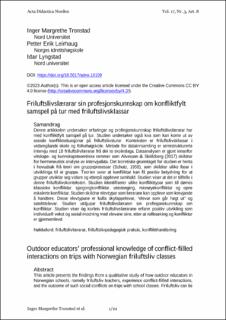| dc.contributor.author | Tronstad, Inger Margrethe | |
| dc.contributor.author | Leirhaug, Petter Erik | |
| dc.contributor.author | Lyngstad, Idar Kristian | |
| dc.date.accessioned | 2024-01-05T09:07:23Z | |
| dc.date.available | 2024-01-05T09:07:23Z | |
| dc.date.created | 2023-11-08T15:46:39Z | |
| dc.date.issued | 2023 | |
| dc.identifier.citation | Acta Didactica Norden. 2023, 17(3), Artikkel 8. | en_US |
| dc.identifier.issn | 2535-8219 | |
| dc.identifier.uri | https://hdl.handle.net/11250/3110043 | |
| dc.description | This is an open access article licensed under the Creative Commons CC BY 4.0 license (http://creativecommons.org/licenses/by/4.0/). | en_US |
| dc.description.abstract | Denne artikkelen undersøker erfaringar og profesjonskunnskap friluftslivslærarar har med konfliktfylt samspel på tur. Studien undersøker også kva som kan kome ut av sosiale konfliktsituasjonar på friluftslivsturar. Konteksten er friluftslivsklassar i vidaregåande skole og folkehøgskole. Metode for datainnsamling er semistrukturerte intervju med 18 friluftslivlærarar frå dei to skoleslaga. Dataanalysen er gjort innanfor vitskaps- og kunnskapsteoretiske rammer som Alvesson & Sköldberg (2017) skildrar for hermeneutisk analyse av intervjudata. Det teoretiske grunnlaget for studien er henta i hovudsak frå teori om gruppeprosessar (Schutz, 1958), som skildrar ulike fasar i utviklinga til ei gruppe. Teorien seier at konfliktar kan få positiv betydning for at grupper utviklar seg vidare og etterpå opplever samhald. Studien viser at det er tilfelle i denne friluftslivskonteksten. Studien identifiserer ulike konflikttypar som til dømes klassiske konfliktar, sjargongkonfliktar, utestenging, misnøyekonfliktar og opne eskalerte konfliktar. Studien skildrar elevtypar som lærarane kan oppleve som krevjande å handtere. Desse elevtypane er kalla skylappelevar, ‘elevar som går høgt ut’ og satelittelevar. Studien utdjupar friluftslivslæraren sin profesjonskunnskap om konfliktar. Studien viser òg korleis friluftslivslærarane erfarer positiv utvikling som individuell vekst og sosial modning med elevane sine, etter at rollesøking og konfliktar er gjennomlevd. | no_NN |
| dc.description.abstract | This article presents the findings from a qualitative study of how outdoor educators in Norwegian schools, namely friluftsliv teachers, experience conflict-filled interactions, and the outcome of such social conflicts on trips with school classes. Friluftsliv can be translated as ‘outdoor life’, and it is used in the Nordic countries for going on trips in nature and nature connected outdoor activities. The data analysis draws on the theoretical framework of science and knowledge that Alvesson and Sköldberg (2017) describe as a hermeneutic analysis of interview data. The method for data collection is semi-structured interviews with 18 friluftsliv teachers from upper secondary schools and folk high schools. The theoretical basis for the study is mainly taken from the theory of group processes, which depicts different phases in the development of a group. The theory says that conflicts can positively affect group development and lead to improved cohesion, and the findings of the study support this. The study identifies and names classic conflict types: jargon conflicts, exclusion as conflict, conflicts due to dissatisfaction among students, and open escalated conflicts. It also highlights and gives names to some student types, which the teachers express as challenging to handle. The study contributes to the professional knowledge friluftsliv teachers have about such conflicts, and also shows how friluftsliv teachers describe individual growth and social maturation among students as possible long-term positive outcomes of conflicts. | en_US |
| dc.language.iso | nno | en_US |
| dc.subject | friluftslivlærarar | no_NN |
| dc.subject | friluftslivpedagogisk praksis | no_NN |
| dc.subject | konflikthandtering | no_NN |
| dc.subject | conflict management | en_US |
| dc.subject | friluftsliv teacher | en_US |
| dc.subject | outdoor education | en_US |
| dc.subject | Norway | en_US |
| dc.title | Friluftslivslærarar sin profesjonskunnskap om konfliktfylt samspel på tur med friluftslivsklassar | no_NN |
| dc.title.alternative | Outdoor educators’ professional knowledge of conflict-filled interactions on trips with Norwegian friluftsliv classes | en_US |
| dc.type | Peer reviewed | en_US |
| dc.type | Journal article | en_US |
| dc.description.version | publishedVersion | en_US |
| dc.rights.holder | © 2023 Inger Margrethe Tronstad, Petter Erik Leirhaug, Idar Kristian Lyngstad | en_US |
| dc.source.pagenumber | 22 | en_US |
| dc.source.volume | 17 | en_US |
| dc.source.journal | Acta Didactica Norden | en_US |
| dc.source.issue | 3 | en_US |
| dc.identifier.doi | 10.5617/adno.9946 | |
| dc.identifier.cristin | 2194140 | |
| dc.description.localcode | Institutt for lærerutdanning og friluftslivsstudier / Department of Teacher Education and Outdoor Studies | en_US |
| dc.source.articlenumber | 8 | en_US |
| cristin.ispublished | true | |
| cristin.fulltext | original | |
| cristin.qualitycode | 1 | |
